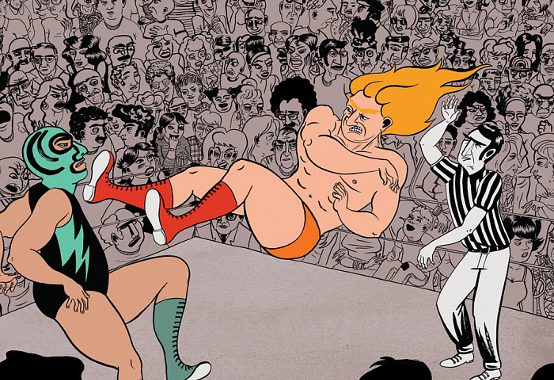Pro Wrestling (With Angels)

CDs of “Beat the Champ,” the new album from indie folk/rock band the Mountain Goats, come with a small white sticker proclaiming: THIS RIGHT HERE IS AN ALBUM ABOUT PROFESSIONAL WRESTLING. I guess they had to get the ironic disclaimer out of the way: Yes, this is a weird thing to do, roll with it please. If you do roll with it you will find an utterly unironic tribute to the wrestling heroes of singer/songwriter John Darnielle’s childhood—and one of his band’s best albums.
The songs explore many of Darnielle’s recurring themes: memory, what it’s like to feel nostalgia for a childhood and adolescence that were marked by abuse and fear, the escape into an inner world of imagination, and the way not only gentler emotions but thwarted rage find a haven in that imaginary world. Pro wrestling is a storytelling sport (like figure skating, the sport onto which I passionately project my own issues) and so it’s made for people who need a primary-colors story that’s better than the one they’re living.
The album opens hard on the piano chords of “Southwest Territory” (place is once again a character in the Mountain Goats’ songs), and the songs find a rhythm that alternates between nostalgia and ferocity. There are a lot of fathers and sons in these songs. Darnielle’s liner notes are up-front about what he’s doing here:
It’s always a challenge for me to state simply what things were like between my stepfather and me, because there were few sweet spots that didn’t end up getting polluted or corrupted by the dynamic of abuse, but in wrestling we had a point of contact: in many ways, he was a child who’d never grown up, and he liked to play the part of an antagonistic older brother at the fights. …
The situation in my house was deteriorating badly and permanently during the span of my hyper-fandom, which lasted from when I was nine until I was maybe thirteen. My life was chaotic and frightening. I did not cheer the heels. I feared and hated them. I wanted to see them punished. When, in the heat of battle, the good guys would abandon the rulebook in order to fight fire with fire, something in me responded primally.
“Beat the Champ” is a fairly blunt-force album. It has anthems like “The Legend of Chavo Guerrero,” and Darnielle shows off his terrific capacity for making threats in “Werewolf Gimmick,” which reaches a kind of ecstasy of rage. There’s the never-surrender guy in “Choked Out,” who feels himself “at one, for once, with the universe” as he loses consciousness; and there’s Bull Ramos, “that old wrestler with the bullwhip,” sitting blind and invalid on his porch in Houston, happy in the memory of friendship. There’s humor here, but it’s gallows humor: the blurting comedic horns as Darnielle sings, “I personally will stab you in the eye! With a foreign object!”
I love the childlike, rippling woodwinds in “Southwest Territory,” and the way Darnielle’s voice is strained to breaking as he portrays a wrestler switching from good guy to heel, and the gorgeous, limpid piano ending of that song. The thriller violins of “Stabbed to Death Outside San Juan” and the battering drums of “Werewolf Gimmick.” The most intense and punishing songs are always followed by relief.
This is a beautifully-constructed album—you can feel its architecture, its timing—and all of that construction is in the service of some of Darnielle’s most resonant writing. Most of these songs are written from a place where the longing for justice has started to become infected, just started to transform into rage. I’m tempted to say that it was “always already” infected, that human justice will always werewolf when the wolfsbane blooms. But this album, like Darnielle’s novels, captures both sides of justice perfectly: our need for it (honoring this need for justice is a prerequisite of forgiveness, if forgiveness is something you’re concerned with) and the cruelty we commit in service of that need.
“Beat the Champ” ends, as it probably had to, with a story of defeat. After all the triumphs in the ring the lasting triumph is survival: reaching a place where you don’t need to play the hero anymore.
Eve Tushnet is a TAC contributing editor, blogs at Patheos.com, and is the author of the recently-released book Gay and Catholic: Accepting My Sexuality, Finding Community, Living My Faith.
Comments